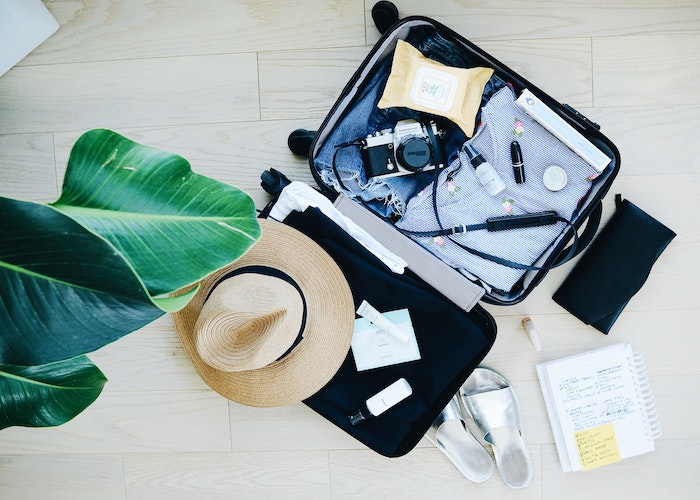7 Ways I Manage My Money Better After Moving to Europe, Despite My Huge U.S. Debt

In the summer of 2019, my husband and I packed up our Colorado lives and moved to Berlin, Germany. I had always wanted to live overseas and after a few false starts, we were finally taking the leap. It’s been over a year now, and I’ve realized that I manage my money much differently in Berlin than I did in the US, majority of which I feel have been both positive and progressive.
Here are a few examples below.
1. Taking A Pay Cut
Moving to Europe meant coming to terms with accepting pay cuts for both of us. Salaries in Europe are generally much lower than salaries in the US — something I didn’t realize until I was well into my job search. This wasn’t a dealbreaker, but it was definitely a shock. The cost of living is also much lower which helps to offset the gap, but it was still hard not to feel like we were going backward.
2. Getting Paid Monthly
It’s common in Europe to get paid once a month, which can really be a struggle without a proper budget. Initially I was worried about spending too much early in the month only to run out later, but this mindset actually led to less spending overall. Now that I’m used to the pay cycle, I actually think I prefer it this way. I find that it’s easier to track my monthly bills and I’m less tempted to buy unnecessary things since I only have one payday instead of two. Getting paid monthly forces you to have a plan for your money and stick to it.
3. Managing My Large Amount of U.S. Student Debt
I have a ton of student loans from graduate school, and while we spent the past 3 years throwing as much money as possible towards lowering the principal balance, I knew that my payments would have to be lower while living overseas (see above: taking a pay cut). I track our budget in euros since we earn in euros, but my student loans are set to autopay from my US account. This means keeping an eye on my US bank accounts and making sure to transfer money if the balance gets too low. I’m still paying more than the minimum each month, and have been able to make a few extra lump-sum payments this year, but my progress has definitely slowed because of our move. To me it’s worth it since I’m fulfilling a lifelong dream, and I know that I can hopefully pick up the pace of my payments once we return to the US.
4. Lower Cost of Living
The flip side of taking a pay cut is that the cost of living in Berlin is also cheaper. It’s definitely not what it was 10 years ago, but rent including utilities and internet is still slightly less than half of what we paid in Colorado. The monthly transit pass is 65 euros (79 USD) for unlimited use; much less than gas, car insurance, and maintenance for two cars. Groceries are about the same but dining out is really affordable and incredibly diverse. It’s possible to get a full meal for €5-6 ($6-7) and beers from the corner “späti” are usually under €2 ($2.50). We used to limit our restaurant outings to once or twice a month, but now have room in our budget for more frequent exploring.
5. Buying Less
Not only do I have to carry home everything I buy on public transit, which is a huge deterrent for making unnecessary purchases, but I also think the European mindset is focused more on quality over quantity. People tend to buy one pair of nice boots instead of three cheap pairs, and rewear outfits much more frequently than most Americans. It’s easier to say no to buying extra clothes/shoes/accessories since those IKEA wardrobes only hold so much and closets don’t really exist here. Finding a long-term apartment in Berlin is also notoriously difficult, and it’s common to move very frequently. Who wants to haul loads of stuff to a new apartment every year? Not me.
6. Cash-Based Living
In the States, I often went weeks without carrying cash in my wallet. Trying to do that in Germany would make life very difficult. Many places take cards (especially with the pandemic), but cash is still king. ATMs are everywhere, but I always try to make sure I have at least €10 with me whenever I go out.
7. Debit vs. Credit Card
When I do use a card to pay, it’s a debit card instead of credit. I used to put every single purchase on a credit card in the name of points, so using debit was strange at first. While we still use credit cards (with no foreign transaction fees, of course) for big purchases, the switch to debit has made me more mindful of my spending habits. N26 is the most popular bank for expats here, and they send push notifications for every purchase. This not only forces me to think twice about what I buy, but it also saves me the trouble of combing through credit card statements later to make sure there isn’t any fraudulent activity. Sometimes I miss earning tons of points, but only buying what I can actually pay for will serve me better in the long run.
One of the biggest things I’ve learned from our time in Berlin is that purchases that felt necessary in the States are considered extras in Europe. In a city where everyone is free to be who they are, I feel less pressure to “keep up with the Joneses” and I’ve aligned my spending habits accordingly. I hope that mindset sticks with me when we eventually move home, and I can take all that extra money and invest it or save for retirement. In this crazy year, I’ve also learned that life is short and it’s important to prioritize your goals. Don’t let managing debt get in the way of following your dreams; it’s possible to do both!
Aly is an avid traveler and ice cream enthusiast currently based in Berlin. An explorer at heart, she can usually be found out in nature, on a run, or trying new recipes in the kitchen. You can read more about her adventures abroad on her fledgling blog here.
Image via Unsplash



